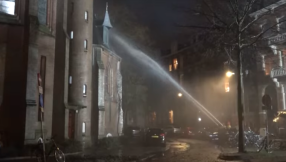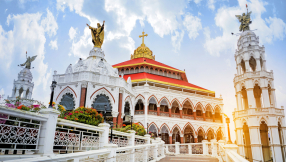
Members of the Church of England’s General Synod arrived in York yesterday for five days of deliberation and discussion.
Before the debate returned to questions of spending, sexuality or safeguarding, Synod considered the very real threat of global conflict and the way the Church might respond.
The Rt Rev Hugh Nelson, Bishop of St Germans and Bishop to the Armed Forces, hit the headlines, when the agenda was published, for telling reporters: “As a Church, we want to take seriously those challenges – to do everything we can to pray for and work for peace, because the kingdom of God is a kingdom of justice and peace – and to face the reality and begin conversations around what it might mean to be a Church in a time of conflict.”
Yesterday, General Synod was briefed by Brigadier Jaish Mahan, Deputy Commander of the 1st (United Kingdom) Division. This Light Forces Division is one of the UK’s two combat divisions and for the past year they have had the responsibility of leading NATO’s Allied Response Force, which Mahan explained meant “being ready to intervene in any crisis that requires a military response”.
In an impressive performance, the Brigadier, who himself is a Christian, told Synod that, “The military, like the Church, is part of the fabric of our nation, fundamental pillars that hold together our house, our society.”
Mahan highlighted ways in which the Church has shaped and continues to support the military. Pointing to the motto of the Royal Military Academy, Sandhurst, “Serve to Lead”, he explained, “That model of servant leadership, putting others before ourselves, epitomised by Christ’s example, is the way that we operate in the Army.”
He described the chaplains to the Armed Forces as “truly exceptional people” and “a very strong cohesive force especially in challenging times and sometimes even in tragedy”. It is a role that goes beyond pastoral and spiritual support and includes moral guidance, as Mahan put it, “often helping our leaders make the right decisions on a difficult day.”
Throughout the presentation, Mahan wove in aspects of his personal faith and how it helped him to understand the world and his place in it.
Acknowledging that some might be “uncomfortable with a close association with the military”, Mahan explained that his personal opinion was, “That the world, whilst wonderful on many levels is still fundamentally broken, in its truest sense far from Eden, and will remain that way until the Second Coming.”
Joining the military, he said, offers a way, “to be part of protecting our people and our nation.”
In answer to that call, Mahan has completed tours in Kosovo, Sierra Leone, Iraq and Afghanistan. One of the most moving moments of his speech was when he quoted these words from Psalm 139, from memory: “Where can I flee from your presence? If I go up to the heavens, you are there. If I make my bed in the depths, you are there. If I rise on the wings of the dawn, if I settle on the far side of the sea, even there your hand will guide me, your right hand will hold me fast.”
“Powerful words,” he reflected, “that have been a real comfort when you find yourself in far-flung areas around the world.”
Alongside the words of comfort, the Brigadier had two challenges for Synod.
The first was to continue “to pray for and support those men and women and their families that put themselves in harm's way to protect our nation”.
The second was to take seriously the risk of “expanded conflict” and the need for the Church to be prepared for the “complexity of challenges”, which would necessarily follow.
Mahan pointed to the past, setting out how during national wars the Church had “been a fundamental bulwark”, taking on responsibility for “spiritually supporting those deployed to families at home, and the wider societal preparedness for national defence and the fear and insecurity that can bring”.
He warned that this was all the more critical due to the “paradigm shift” that has taken place in recent conflicts, meaning that if the UK were to commit troops to a conflict, advances in technology would mean it would be more like Ukraine than Afghanistan.
In response, the Rt Rev Hugh Nelson, has promised a suite of theological, liturgical and practical resources called “Being church in a time of conflict”.
It seems the bishops have learned the lessons of Covid, and may indeed join with the Armed Forces in being “key cornerstones that can always be relied on in our nation's time of need”.
Brigadier Mahan's full briefing can be seen here: https://youtu.be/KrNDR-r3eT4
Susie Leafe is director of Anglican Futures, an organisation that provides pastoral and practical support to orthodox Anglicans.













